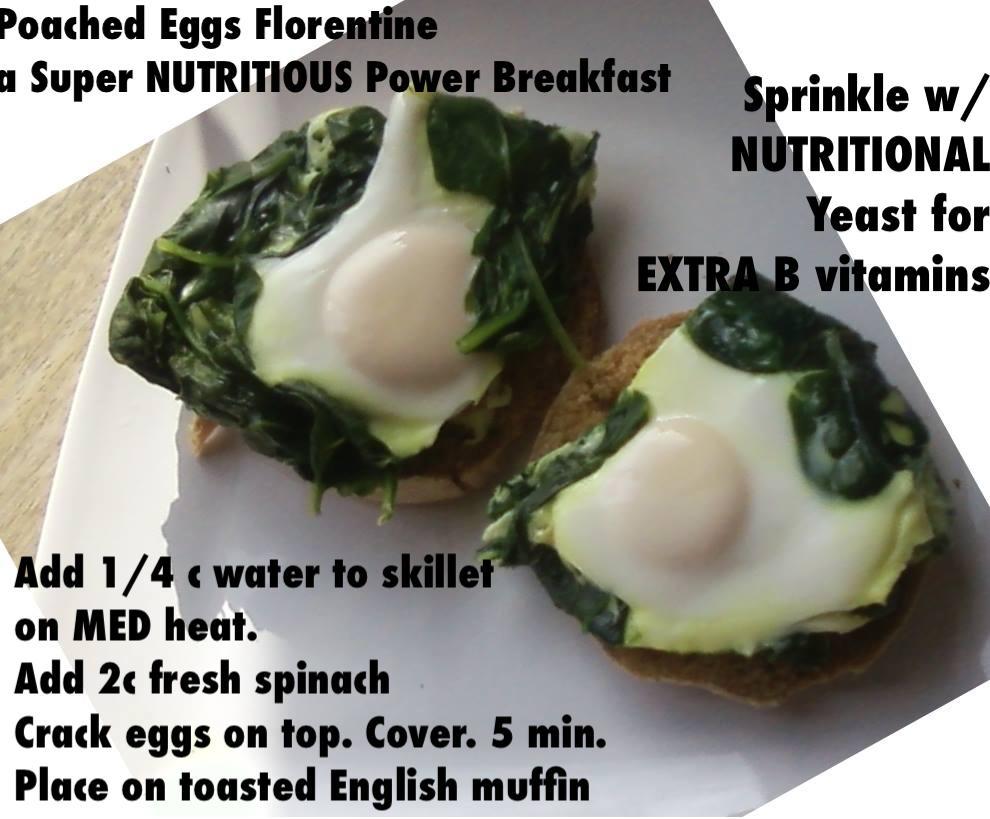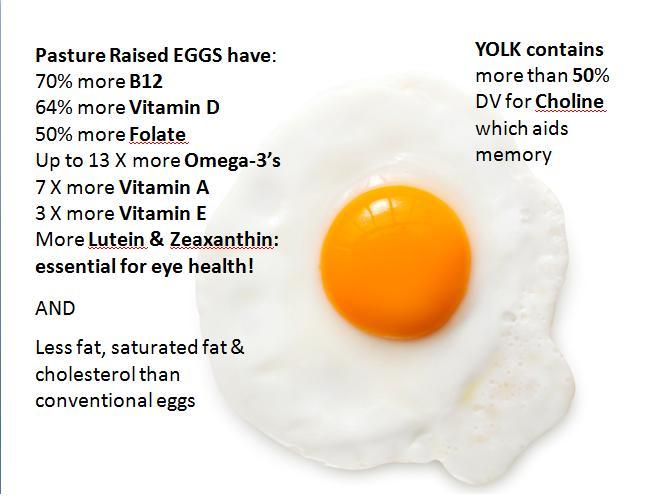EAT the WHOLE EGG!!!…by Elizabeth Brown, MS, RD
EGGs Rule!
Eggs are rich in vitamins A, D, E and B12 which are often difficult to obtain from a vegetarian diet. Eggs are also a good source of riboflavin, folate, calcium, iron, phosphorus and zinc as well as being an excellent source of selenium, a powerful antioxidant also found in seafood, poultry, nuts and whole grains.
To get ALL of these key nutrients, you MUST eat the WHOLE EGG!!
Eggs are the gold standard for protein. When we look at the protein quality and content of other foods, eggs are used as the reference protein because an egg contains the perfect amount of all of the essential amino acids in the perfect proportion.
Think about it. An egg contains everything needed for the nourishment of a developing chick. Of course it should be perfect.
Eggs promote weight loss. In a study of 160 overweight people, those who ate 2 eggs per day lost more weight. All of the participants followed a low-fat diet with a 1,000 calorie deficit, but half of the group ate two eggs per day for breakfast while the other half ate a bagel breakfast containing the same amount of calories and weight mass.
After eight weeks, the egg eaters lost almost twice as much weight, had an 83 percent greater decrease in waist circumference and reported greater improvements in energy. There was also no significant difference between blood levels of total, HDL and LDL cholesterol and triglycerides in either group.
Other studies looking at relative risk showed that healthy people can enjoy eggs without increasing heart attack risk.
Although eggs are high in cholesterol, 212 mg per egg, they do not necessarily increase your body’s total cholesterol. Most of the cholesterol in our body is made by our liver, about 1,000 mg per day and another 200-500 mg can come from the diet. In most individuals, cholesterol production is REDUCED when dietary intake increases.
Cholesterol is part of the structure and function of cell membranes. It is a component of several sex hormones, and it is an essential precursor to Vitamin D. Cholesterol is also a component of bile acid. Bile helps your body breakdown fat into useable parts.
Eggs are one of the few animal sources of the antioxidants lutein and zeaxanthin—carontenoids that protect the eyes.
Eggs can be high in beneficial fats. When chickens are fed a flaxseed-rich diet, they convert the Alpha-Linolenic-Acid (ALA) omega-3 fat into DHA, another omega-3 fat. DHA is the Omega-3 fat associated with brain health although both types of omega-3s do help reduce inflammation.
Buy eggs from Pasture Raised hens for the most health benefits. These hens live mainly on grass and bugs and therefore get naturally occurring sources of omega-3 fats. The eggs from these free-roaming feathered friends contain up to 20 TIMES more OMEGA-3 FATS than their conventionally raised, caged counterparts 🙁
Pasturing is the traditional method of raising egg-laying hens and other poultry. It is ecologically sustainable, humane, and produces the tastiest, most nutritious eggs.
Pastured eggs also have 10 percent less fat, 40 percent more vitamin A, and 34 percent less cholesterol than eggs obtained from factory farms.
Eggs Benedict is a rich egg dish traditionally made with buttered English muffins, topped with Canadian bacon, poached eggs and creamy hollandaise sauce. At nearly 1,000 calories, with 56 grams of fat, 23g of saturated fat, 525 mg of cholesterol and up to 2000 mg of sodium, it’s an occasional treat that leaves little room for much else that day.
Instead try this treat, a nutrient-dense and satisfying yet guilt-free version of Eggs Benedict. A soon-to-be daily indulgence for ovo-vegetarians.
Eggs (Benedict) Florentine with nutritional yeast cheese sauce
2 eggs (omega-3 rich)
4 cups fresh spinach or 1 cup frozen
1 tsp white vinegar
Make the cheese sauce first and set aside. Then steam the spinach and place in two piles on a plate. To poach eggs: Fill a saucepan with 3 inches of water. Bring water to a gentle simmer. Add vinegar. Carefully break eggs into simmering water. Allow to cook for 2 1/2 to 3 minutes. Yolks should still be soft in center. Remove eggs from water with a slotted spoon and set on top of spinach. Top with 1/4 cup nutritional yeast cheese sauce on each egg.
Per serving: 280 calories, 15 g fat, 370 mg cholesterol, 8 g fiber, off the charts for pretty much every nutrient including carotenoids and especially B vitamins from the nutritional yeast.
Nutritional Yeast Cheese Sauce
3 Tablespoons flour
2 Tablespoons canola oil
1 cup filtered water
1 Tablespoon stoneground mustard
1 clove crushed garlic
1/4 teaspoons white pepper
1/4 teaspoons sea salt
1/4 cups nutritional yeast flakes (found in supplement section at Whole Foods)
Mix flour and oil in a sauce pan set on medium-low heat. Add all ingredients EXCEPT nutritional. Bring to a boil on medium heat, reduce heat and simmer for a few minutes. Add nutritional yeast and mix well. Simmer 8-10 minutes. Serve over eggs today over brown rice and vegetables tomorrow. Store in fridge for up to two weeks.






